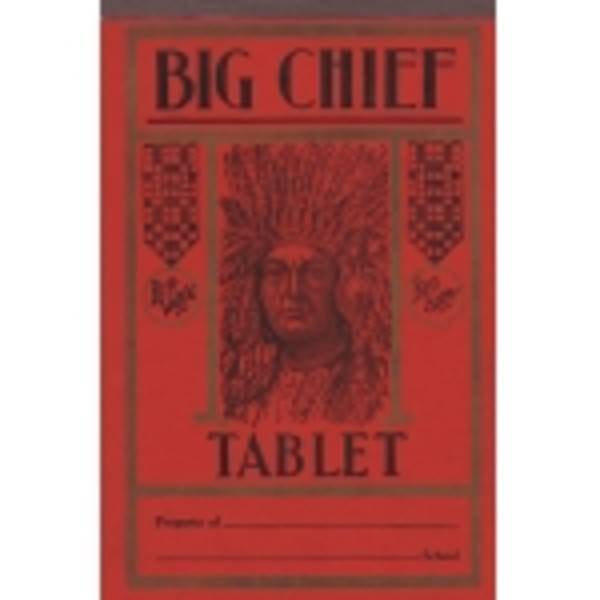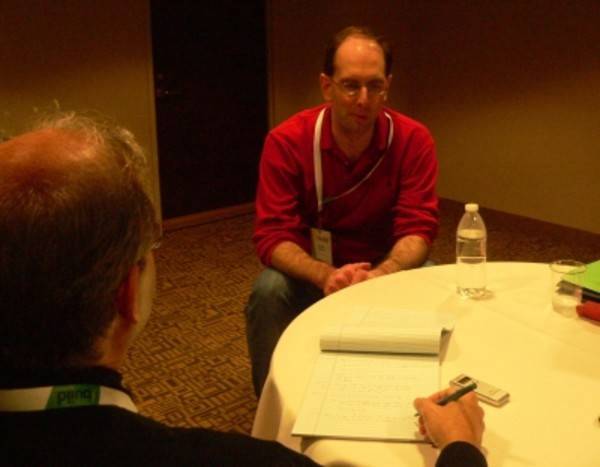Back in the 1980s, one of my first publishers asked me for a quick biography paragraph to place at the end of a story. “Tell your readers about yourself,” an editor said. “He fills infinite pieces of paper,” I wrote. (It was the shortest piece I ever composed.)

Since that time, I’ve been presented with a countless number of form factors of strange components vying to replace my use of paper for keeping notes. Paper is wasteful, it gets lost, it reduces the number of trees, it consumes space. Think of how the environment would love me if I rid myself of the romance that I could record the passing parade of the world with a pencil.
Just since I accepted the assignment of Enterprise Correspondent for ReadWriteWeb last August, I’ve consumed nearly three reams of 20-lb. bond, 8.5 x 11″ paper for notes on interviews, article drafts, and strange diagrams that float to my mind when I’m trying to explain some sort of data center configuration or Web resource allocation. I am the reason Staples remains in business despite the iPad.
That’s me a few months ago interviewing Scott Guthrie, Microsoft’s senior vice president in charge of Windows Azure. I’m the only one who entered the interview room that entire week carrying a legal pad. There were some other reporters joining me during the week, a few of whom laughed when they saw me at work, often writing without looking down.

Making sense of the mess
Perhaps I’m slowly mutating into Andy Rooney, the late CBS News writer who, in the latter part of his life, mourned the passing of once-commonplace objects. But the truth is, portable computing devices contain no software, no functionality, no apps that substitute for the functions paper performs in my life. So for me, “dead trees” have yet to die out. Yes, I’ve seen Evernote, and I even like it. But in response to the many folks who’ve met me in person and asked if I forgot my tablet, I’d like to explain the key reasons why technology has yet to break my dependence on paper:
1. Not every note I jot down has to make immediate sense. (Please suspend your thoughts about how that state lingers on until the comments.) Most note-taking software I’ve seen works very hard to translate the scratches I write into explicit characters or symbols. I have used certain symbols to mean particular things – for example, > to mean “make this idea into a heading,” and < to mean “make this parenthetical.” But I often draw boxes and wavy lines around ideas that I’m considering redeveloping into a different structure and organization. Software would suggest actually reorganizing the paragraphs, but that’s not what I want because I’m considering the change, I haven’t signed off on it. (That’s where my checkmarks come in.) I draw on my notes the way a verbose professor gesticulates with his hands; the gestures mean something to him, and maybe only in the context of what he’s saying at the time, though they may only be loose gestures to anyone else trying to interpret them.
2. I’ve developed a working shorthand that no character recognition software can account for, unless it were explicitly made capable of learning its patterns. Words written frequently become merged into uniform gumballs of a sort, the components of which might perhaps (by archeologists) become extrapolated into abbreviations. VP (for “Vice President,” a title shared perhaps by at least a few thousand people I’ve interviewed) gets construed as a kind of bent rapier sword; Mktg. (“marketing”) looks like an “M” sucking the other letters into a black hole; and apl___n (“application”) looks like it was squashed by a giant foot.
3. Paper is my missing memory. As ridiculous as this might seem, I have a kind of partial eidetic memory. It’s photographic in that I can remember faces and scenes, in full color. (I credit my mother, the artist, for helping me hone this faculty.) But I cannot remember things that are ordinary, regular, or homogenous for any length of time at all – for example, streams of digits in columns, like telephone numbers. I can distinctly recall things I have written down, for perhaps the most inefficient of reasons having to do, I suppose, with how my brain is wired (or not): I can see myself writing it, and I recall the shape of the paragraphs, or their placement on paper. Perhaps this is why I have better luck recalling E. E. Cummings poetry than Shakespeare sonnets. Note-taking gives me the freedom to sketch and sculpt what I’m thinking in a way that makes it unique enough that I can recall it without having to re-read the note. Otherwise, if I don’t write it down, I’m liable to forget it no matter what shape it took in my mind when I first thought of it.
Let it be
It has occurred to me more than once that a note-taking apl___n – perhaps a next-generation OneNote or Evernote – that would be even moderately useful for me, might be unfathomably useful and even simple for a normal person like yourself. If software worked more like paper, then mobile apps themselves, and maybe even the Web, could be more intuitive, more functional, easier to embrace.
But the developer would need to rethink her mindset about the typical data management app, to work instead like this:
1) Various items of input data may end up having separate classes (for instance, a doodle, a stanza, a phone number, a measure of music), but the software should determine what those classes are after the raw data has been jotted down.
2) Where you create something would be as important as what you create, so when you search for something you jotted down earlier, geometry (what shape it takes), placement (what part of the page), and where you were at the time (in your office, in the kitchen, outside sledding in the driveway) should be treated as parameters.
3) Interpret handwriting as text, certainly, but don’t convert it on screen. Note-takers remember the way things look, not what they say.
4) Although the cloud has infinite storage, and wireless systems now have massive bandwidth, it’s more important for the note-taker to remember the note than for the software to store its contents. The reason I don’t let a maid clean my desk, even at a hotel, is because I’ll lose track of everything the maid will have neatly rearranged. The filing system for notes should be something the user can relate to physically – not a rack of virtual folders or a cloud of limitless space, so much as a stack of pages arranged on a virtual desktop wherever they may happen to fall. As I’ve often told my wife when she nearly faints at the state of my own desk, “I haven’t lost anything yet.” (At least not anything I recall.)

















